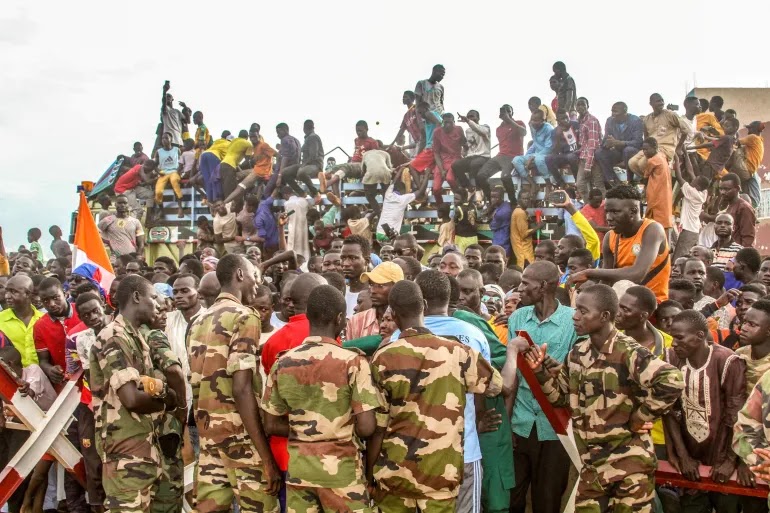Popular and military movements in Niger after ECOWAS decided on the date of intervention

Today, the Nigerien capital, Niamey, is witnessing popular movements in support of the coup leaders and a rejection of the possible military intervention of the countries of the West African Group (ECOWAS) in the country, a day after the leaders of the group's armies decided the date of the military intervention to restore constitutional order.
Meanwhile, officers from the chiefs of staff from Niger, Mali, and Burkina Faso held a meeting in Niamey as part of efforts to counter potential military intervention.
Burkina Faso's Defense Minister, Gasoum Coulibaly, announced his country's readiness to confront the possible military intervention of the ECOWAS group in Niger.
Coulibaly expressed his country's opposition to any "aggression" on Niger, announcing Ouagadougou's readiness to withdraw from the ECOWAS group, which he described as irrational in its policy towards Niger.
Coulibaly also considered that chaos in Niger benefits terrorist groups, as he put it. He expressed regret that some countries in the region support the option of war under the guise of democracy, he said.
Hours after ECOWAS' decision, officers of the chiefs of staff of the armies of Mali, Burkina Faso, and Niger met to discuss a joint defense strategy, in response to ECOWAS' declaration of readiness for military intervention.
Early on Saturday, state television in Niger spoke of a meeting of military leaders from the three countries in the capital, Niamey, to decide "concrete measures" if the ECOWAS group chooses to "escalate a war."
Mali, Burkina Faso, and Niger are subject to military rule after the coups that took place in each of them, and therefore their membership in the ECOWAS group was frozen.
State television broadcasted pictures of warplanes, which it said were aircraft from Mali and Burkina Faso that were deployed in Niger, in implementation of the two countries' pledges to stand by Niamey, in response to any possible military intervention by ECOWAS.
These developments came after the ECOWAS group announced - after the meetings of its armies' leaders in the Ghanaian capital, Accra, on Friday - that it had agreed on a plan and date for possible military intervention in Niger, but made it clear that it would not enter into an avoidable war.
Over two days, the leaders of the armies of 9 out of 15 countries discussed ways to restore the ousted president, Mohamed Bazoum, to power in Niger after he was overthrown in a coup on July 26, stressing their readiness to intervene militarily if diplomatic efforts fail.
ECOWAS Commissioner for Political Affairs, Peace, and Security Abdel Fattah Moussa said, "We are ready to go at any time when the order is issued. The day of the march has also been set, but we will not disclose it."
Moussa added, "The military option is not our preferred option, but we are forced to do so because of the intransigence of the military council in Niger."
He stressed that all member states of the group provided the necessary resources to implement the process, stressing that any intervention in Niger would not be a declaration of war against it, and would be short-term and aimed at restoring constitutional order.
The Washington Post warned that the escalation of rhetoric on the part of ECOWAS and its clear intention to use force would threaten the failure of diplomatic efforts to restore democracy and end the military coup in Niger.
The possibility of ECOWAS intervention in Niger - according to the newspaper - also heralds the outbreak of a wider regional war, which raises great concern because hundreds of Western soldiers are stationed in the region, including American and French forces.
The spokesman stated that Washington is currently focusing on diplomatic efforts to reach a peaceful solution to preserve Niger's hard-won democracy, as he put it.
The New York Times published a report on the detained President of Niger, Mohamed Bazoum, in which it said that he was being celebrated and praised outside Niger, but criticized in his own country.
Observers say - according to the newspaper - that Bazoum failed to adequately explain his ideas to the public despite his teaching skills, such as his support for girls' education.
Bazoum's Western and African allies are trying to negotiate his release, but their hopes of restoring him to power are fading fast.
The American newspaper quotes experts in the region as saying that the putschists have strengthened their grip on the joints of the state, and Bazoum must be well aware that he has lost his position.
Source: Agencies



.png)
.png)
.png)

Post a Comment